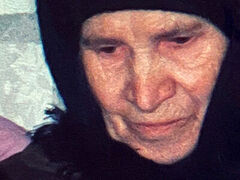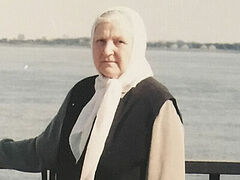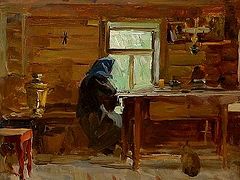Only the Lord with His strong hand supported
and helped me in difficult moments,
and there were so many of these difficult minutes!
Nun Ambrosia of Shamordino Convent
 Alexandra Dmitrievna Oberucheva “I was born on April 4, 1870,”—this is the beginning of the book with a long title, The Story of an Old Woman, Whom the Lord Did not Abandon and Who Always Considered Herself a Happy Person, Even Amid the Most Severe Suffering. The book is based on autobiographical notes and the diary of Nun Ambrosia of Shamordino Convent, who lived a long and dramatic life. She saw two world wars, the Revolution, the persecution of the Church, the terrible suffering of people of her generation and experienced them herself: havoc, famine, epidemics and repression. Many troubles and sorrows fell to the lot of this amazing woman: the deaths of her loved ones, serious illnesses, trials and tribulations after the closure of the convent, arrest, prison, exile, terrible poverty and backbreaking work. But Nun Ambrosia always humbly and completely trusted in God, leaving her heart open for love and goodness. A person of a pure soul and integrity, a doctor by profession, she treated not only bodies, but also human souls. She was a chosen vessel of God.
Alexandra Dmitrievna Oberucheva “I was born on April 4, 1870,”—this is the beginning of the book with a long title, The Story of an Old Woman, Whom the Lord Did not Abandon and Who Always Considered Herself a Happy Person, Even Amid the Most Severe Suffering. The book is based on autobiographical notes and the diary of Nun Ambrosia of Shamordino Convent, who lived a long and dramatic life. She saw two world wars, the Revolution, the persecution of the Church, the terrible suffering of people of her generation and experienced them herself: havoc, famine, epidemics and repression. Many troubles and sorrows fell to the lot of this amazing woman: the deaths of her loved ones, serious illnesses, trials and tribulations after the closure of the convent, arrest, prison, exile, terrible poverty and backbreaking work. But Nun Ambrosia always humbly and completely trusted in God, leaving her heart open for love and goodness. A person of a pure soul and integrity, a doctor by profession, she treated not only bodies, but also human souls. She was a chosen vessel of God.
Nun Ambrosia (secular name: Alexandra Dmitrievna Oberucheva) was born in Sochi to the family of a military man. The Obruchev family was noted for their piety and purity of life. There was an atmosphere of love for God and for each other in the house, and Alexandra and her only brother Mikhail had a happy childhood. Sashenka [a diminutive form of the name Alexandra.—Trans.] was very attached to her mother, about whom she wrote in her memoirs:
“She spoke gently and little, but her every word was an immutable law for us. And our father would tell us, ‘We all must obey Mama.’ There was special purity in her, which was manifested in her words and behavior. In her presence everyone was shy of saying inappropriate words or judging anyone.”
The mother instilled in her children steadfastness in trials and faithfulness to the instructions they received in childhood.
 Mikhail Dmitrievich Oberuchev When Sashenka learned to read and write at the age of seven, her favorite activity was copying prayers into a notebook. She studied first at the Smolensk Gymnasium (classical school), then at the Moscow Alexandrov Institute for women (1884–1889), from which she graduated with a silver medal. At that time the young lady was strongly impressed by the little book, The Life of the Missionary Father Damien de Veuster, which described the selflessness of a young monk; having contracted leprosy, he felt closer to God and considered himself to be the happiest of missionaries. She was also astounded by F. M. Dostoevsky’s novel, The Brothers Karamazov.
Mikhail Dmitrievich Oberuchev When Sashenka learned to read and write at the age of seven, her favorite activity was copying prayers into a notebook. She studied first at the Smolensk Gymnasium (classical school), then at the Moscow Alexandrov Institute for women (1884–1889), from which she graduated with a silver medal. At that time the young lady was strongly impressed by the little book, The Life of the Missionary Father Damien de Veuster, which described the selflessness of a young monk; having contracted leprosy, he felt closer to God and considered himself to be the happiest of missionaries. She was also astounded by F. M. Dostoevsky’s novel, The Brothers Karamazov.
Because she loved her mother who was often sick, Alexandra longed to see her healthy, and therefore she had the desire to devote herself to medicine. In 1897, she wrote a letter to Emperor St. Nicholas II with a request to allow her to attend lectures privately at the Medical Department of Moscow University. In response she received a message that she had been admitted to the newly opened St. Petersburg Women’s Medical Institute—the only institution in Russia that provided women with higher medical education. Alexandra began her studies with great joy—she felt as if she were crossing the threshold of a holy church rather than an institute. She summarized lectures of venerable professors diligently and spent much time in the anatomical room.
“I recall the feelings I had when we were examining the structure of a living cell and body tissue under a microscope. A special realm was opening up before me, I was astounded by this wonderful structure and involuntarily felt reverence for the Creator of all this,” she wrote in her diary.
Alexandra likewise never missed lectures on theology, which other students rarely attended.
The society of that time was in a state of deep internal crisis. The very idea of a restructuring of the State, of a revolution, excited the minds of young people. The revolutionary contagion penetrated the walls of the Medical Institute as well, and it became the center of a student revolutionary movement. Revolutionaries dragged their fellow students into their groups. Although she attended their meetings, Alexandra Obrucheva did not share their views and felt like a stranger in this environment. At meetings she always openly voted against strikes. She must have had the great courage to oppose the whole team on her own. One day, fearing that the institute might be closed due to yet another strike, she came to classes despite threats of physical violence. In an empty institute the doorman exclaimed: “Why have you come? You may be shot—there are revolvers around the corner!” Alexandra was not afraid, but found a professor and almost forced him to give a lecture. As a result, the strike was disrupted, and the institute was saved.
As a student Alexandra Oberucheva attended lectures by the famous philosopher Vladimir Solovyov (1853–1900), whose religious views were very close to hers. She thanked God for sending this meeting in her life. She went to church and was not afraid of being mocked by her godless fellow students and of being labelled as an obscurantist. And in later life, Alexandra remained true to herself, showed an unbending will and courage in defending her ideals and beliefs—both religious and social.
In the fifth year, the students had an internship at the hospital. Here she first encountered human suffering. Some dying people asked Oberucheva to be with them at the time of their deaths.
“Since that time, I have had a special attitude to the hour of death. It was not something gloomy; to the contrary, I felt that a mysterious fusion of the earthly and the Heavenly was taking place,” we read in her diary.
Before taking the State exams she visited Optina Monastery for the first time. The Elder Archimandrite Benedict (Dyakonov) and the Elder Fr. Joseph (Litovkin) advised her to enter a convent. Elder Joseph’s cell attendant, Fr. Anatoly (Potapov), later became her father-confessor.
After graduating from the institute, Alexandra Dmitrievna began to work tirelessly as a zemstvo [local government in prerevolutionary Russia.—Trans.] doctor in a village of Smolensk province. Setting to work, she wrote down in her diary: “I will treat everyone as my next of kin! Something great and holy awaits me!” Later in life, Alexandra Oberucheva treated every person whom she met on her life path with respect, attention, and Christian love.
The fame of the new doctor spread around the whole neighborhood quickly, and within a few days people started flocking to her outpatient clinic. Aware of her responsibility as a doctor, she did not refuse to help anyone, receiving up to 300 people a day. Patients were brought even from faraway villages on wagons, and then, because of the cramped space in the medical room, they were placed on mattresses on the ground, and Oberucheva would make her rounds, diagnose the patients, giving them prescriptions and the necessary medicine (medicaments in zemstvo clinics were free of charge). Having once come to visit her district, the chairman of the council said, “This is something special—people are coming here as if on a pilgrimage rather than to an outpatient clinic.” After the appointments, which ended at eleven in the evening, she would make night house calls. Returning home early in the morning, she would wake up at the arrival of the first patients. Soon she nearly wore herself out and was often semi-conscious, so Alexandra Dmitrievna was transferred to a new place six months later—to the newly opened Odessa hospital for workers with 5,000 beds. Here she lived in a hostel for doctors and had lunch in the cafeteria for medical staff. When Alexandra Dmitrievna entered the cafeteria for the first time and did not see any icons, she made the sign of the cross facing East, which astonished her non-religious colleagues. Afterwards everyone got used to the fact that Oberucheva never sat down at the table without prayer.
In Odessa a male doctor proposed to her (according to Alexandra, he was “a good doctor and a wonderful person”), but she refused, believing that the duties of a wife and a mother were incompatible with the duties of a doctor, which required devoting herself entirely to her patients. In the Odessa hospital, under the guidance of experienced doctors, for two years Alexandra gained medical experience not only as a therapist, but also as a surgeon. However, her father’s illness made her leave Odessa.
The Oberuchev family moved to their small estate near the town of Yelnya, Smolensk province. On November 9, 1905, her father died, and immediately after that her mother became seriously ill. Alexandra took good care of her with great patience and treated her. She was employed as a doctor at the hospital in Yelnya, where she served for six years. After a work day at the hospital Alexandra Dmitrievna would make house calls and return home late—at nine or ten in the evening. She treated everyone for free and lived only on her salary—she was unmercenary.
“I didn’t take money from patients when they offered it and even insisted… When someone still gave me money, I would say that my mood had been spoiled and I was unable to treat patients.”
 Shamordino. Photo of the late twentieth century
Shamordino. Photo of the late twentieth century
In 1906, Alexandra again visited Optina Monastery and Shamordino Convent. During that visit, Schema-Hieromonk Anatoly became her spiritual father, after a conversation with whom she wrote in her diary: “I am surrounded by something Heavenly, and I feel only holiness and all-encompassing love...”
In Yelnya she had to work in spiritual loneliness (her colleagues were adherents of other faiths), and therefore in 1908 she got a job as a doctor at the community of Christ the Savior in the faraway Simbirsk province. But two years later she had to return to Yelnya because her mother fell sick again. After her mother’s recovery, she went on vacation to Optina Monastery, Shamordino Convent and Sarov. Alexandra Dmitrievna grieved over the death of her mother, who passed away on April 27, 1911. In search of solace, she visited Valaam, where she was overwhelmed by a feeling that she had only experienced in Optina Monastery. That trip had a wholesome effect on her spiritual state. Then she got a job as a zemstvo doctor in the village of Lyubazhi, Kursk province. On the very day of her arrival Oberucheva announced to the patients that there would be no appointments on Sundays and on Church feasts, except for emergency situations, since everyone should attend church on these days. At first the people were not happy with such an announcement, but on the same day a peasant bowed low to her and said: “We are grateful to you for this decision.”
To be continued…



